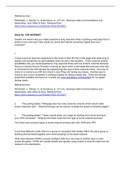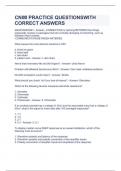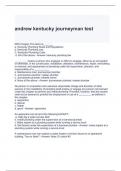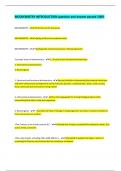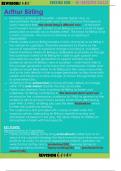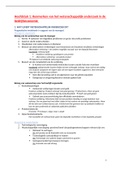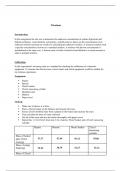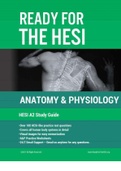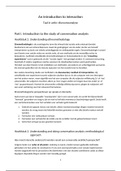academic competences
Made by:
Marloes van Paassen
,1. NENTY 2009, WRITING A QUANTITATIVE RESEARCH THESIS
Two types of problems in quantitative research:
• Aim to increase knowledge
• Aim to make our lives better
Research topic should reflect three components:
• Independent variable: influence on problem
• Dependent variable: problem variable
• Population of study
1st step in tackling the problem: carry out a study to determine amount of influence of the IV’s.
1st chapter of thesis research “The Problem” of “Introduction” analyses/validates problem by:
1. Current observations, experiences, views, opinions of existence of problem
2. Background (historical, cultural, economic, social) of problem
3. Rationale/theoretical/conceptual background/foundation information that provides
knowledge of problem (= major premise)
4. Actual problem
5. Purpose of study
6. Research hypotheses
7. Significance of study
Aim to create existence of problem, make it the stakeholders problem too. Make it interesting, use
current data (no theory). Questions to answer:
• What observations/experiences caught your attention?
• What did you observe, hear, see, experience that’s worth spending time on?
• What prompted your curiosity?
At background problem: put problem in multiple perspectives.
Quantitative research = Theory validation procedure & cyclic in nature. Theory serves 3 purposes:
• Provision of conceptual framework
• Serving as vehicle for incorporating prior knowledge
• Linking research to the larger body of knowledge
Relevant questions for problem statement:
1. What is the problem where a solution for is needed?
2. What problem in any area are you intending to research? (area = education/job/etc.)
3. How and why is this a problem?
Hypotheses are derivable from theory. Questions:
1. What are intelligent/informed guesses or speculations as to the solution to your problem?
2. What are scientific research speculations through which you hope to find solutions?
Speculation = Scientific hypothesis that is tested
Descriptive studies: only research questions; Inferential studies: both research questions and
hypotheses.
, Indicate significance to all related stakeholders:
1. Theory or advancing accumulated knowledge
2. Current literature
3. Policy development and implementation
4. Practices in the field
5. The study’s subjects or participants
6. Teachers and other
7. Practitioners
8. Researchers
Delimitations = scope
Literature review: You review other researchers empirical experience with similar problem. Provide
summary of reviewed literature.
In research design: justify each decision, explain vividly to allow replication of research. How to make
sure there are minimal errors? Describe your population explicitly in terms of geographical limits,
demographic and sociological descriptors, time period covered, etc. What sampling method? What
research instruments? Under what condition is data collected? Etc.
Quantitative research is conceptually made up of 3 sections:
1. Section based completely on verbal discourse (problem presented/analysed/validated;
literature is reviewed/reported)
2. Section based on numerical or quantitative discourse (research variables/concepts/
constructs; operationalization process; hypotheses testing)
3. Section based on verbal discourse again (interpretation of numbers into words)
Answering hypotheses by stating the null hypothesis and explain the variables involved. Reporting
steps of hypotheses:
1. State the statistical version of the hypothesis in null form
2. Present/describe what you did in terms of data analysis procedures to test hypothesis.
3. Present table that has been referred to in (2).
4. What does what you found out imply for the research question or hypothesis under test?
Discussion should be in light of the limitations; present and analyse the convergence and divergence.
Discussions should be analytic, logical and comprehensive and should bring together professional
knowledge. Guide questions:
1. What are findings of other empirical studies that support/fail to support your findings?
2. How has your findings altered, strengthened or weaken the theory on which study is based?
3. What theoretical assertions has your findings been able to account for?
Know what the implication is of the findings of the study to the various stakeholders.


